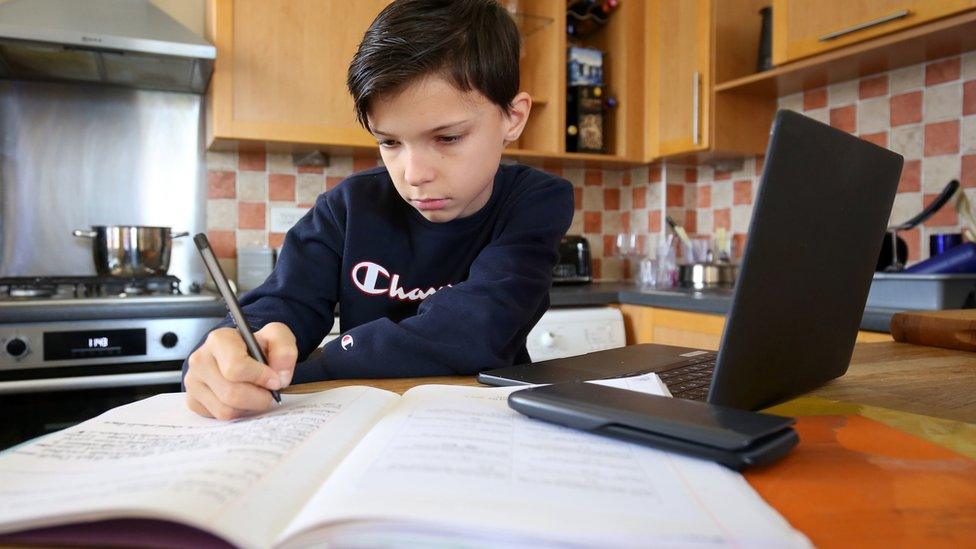Covid-19: How parents plan to tackle lockdown home-schooling
- Published
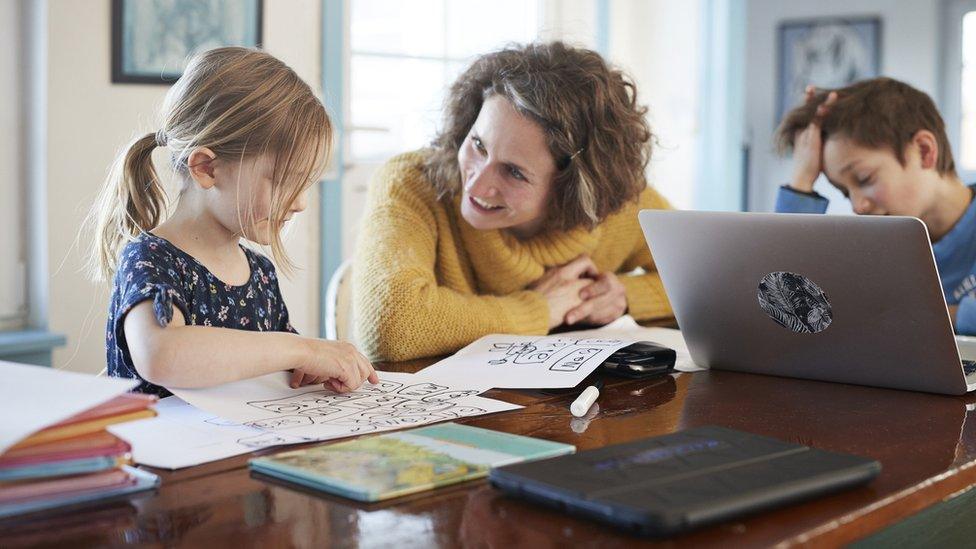
Schools are closed as another coronavirus lockdown comes into effect in England
Parents and children are beginning home-learning after the latest lockdown measures saw schools closed to most pupils. How will they cope and what did they learn from last time?

'Our dining room became a school room'
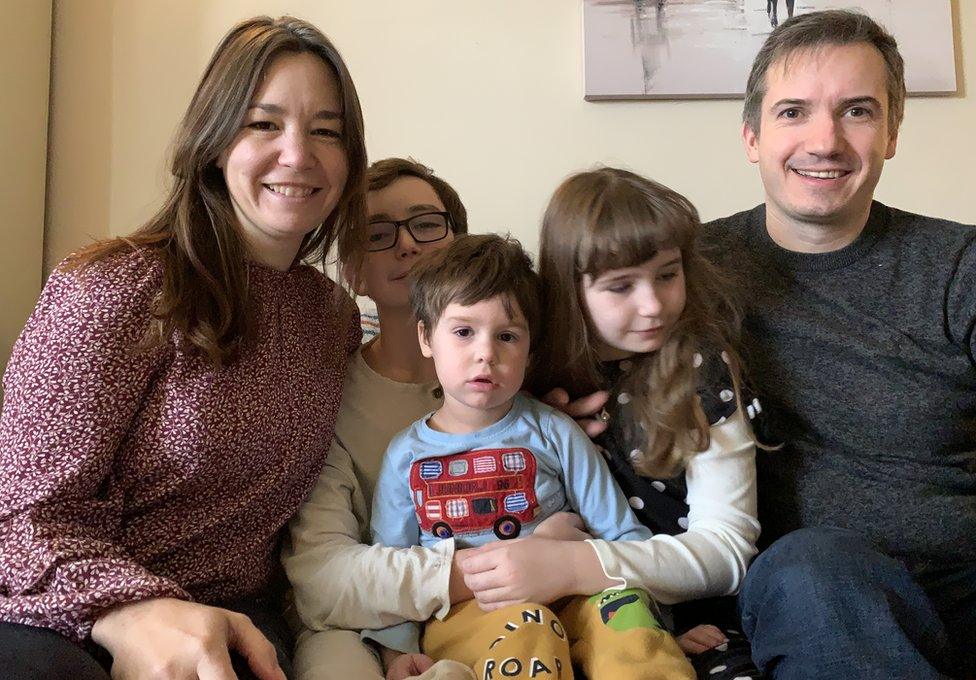
Family of five, the Humphries in Norwich, are applying "everything we experienced the first time"
For the Humphries family in Norwich, structure was the key to "survival" during the first coronavirus lockdown in March.
Mum-of-three Liz Humphries, 42, says: "First time around, it was a case of the schools catching up, everyone was blindsided and I felt like I was making it up off the cuff until they got a handle on it.
"Then I turned our dining room into a school room and I tried to give the children structure."
She adds: "When I was making it up, it was mayhem so I made them get up at a normal time, get dressed and get started at the same time, and we were following the school break and lunch times.
"[Personal trainer] Joe Wicks was a godsend and I made them all do PE and I made sure we got out every day as staying inside was driving us crazy.
"This time, we could all see it coming. I did have a couple of panicky days over Christmas because I knew what was coming and what it was like the first time."
The freelance writer says last time she did it "day by day" with a "survival technique", and she remembers "being overwhelmed" by social media and the resources available: virtual tours, singing, science experiments.
"Everything we experienced the first time, I'm basically applying that again but with a bit more structure," says Mrs Humphries, who has sons Joshua, 12, and Nathaniel, two, and daughter Madeleine, nine.
She says this time, as her eldest son found it difficult to concentrate with his younger brother around, he has set up his workspace in the utility room with his dad Marc.
Meanwhile, Madeleine is set up on her school's online learning programme, which means Mrs Humphries has more time to spend with toddler Nathaniel.
"My top tip would be not to get overwhelmed with everything that is available and set up a structure," she says.

'If my daughters are happy, that's the main thing'
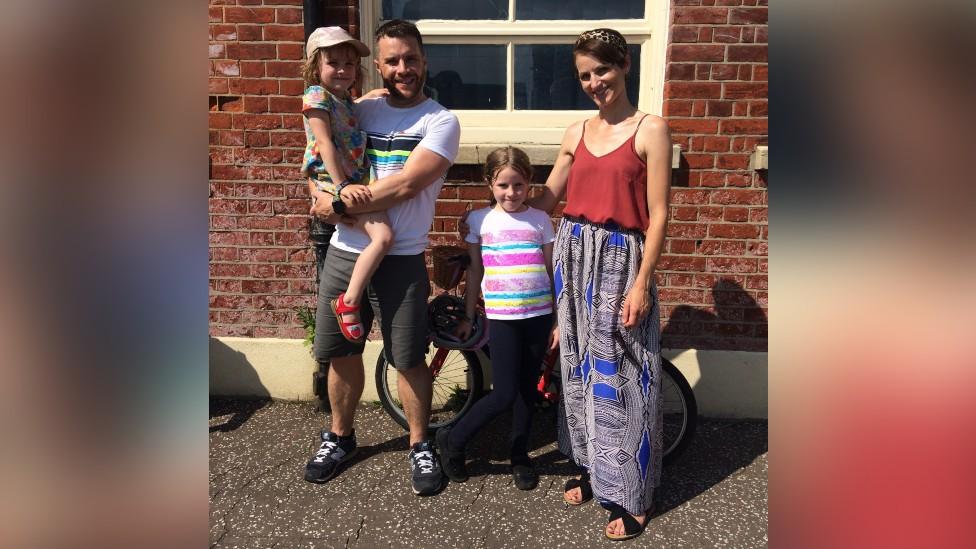
Hannah and Kelvin Colbourn let their daughters take the lead on their learning
A more relaxed approach works better in the Colbourn household.
Hannah Colbourn, who has daughters Mollie, 10, and Nell, seven, says they all started "enthusiastically" with a "full-on timetable" and packed lunches as normal.
"But that lasted for all of three days," she says.
"The novelty wore off and the amount of work that we were doing gradually petered off.
"If we managed an hour of school work a day, I considered that a success."
Mollie goes to Avenue Junior School in Norwich while Nell goes to nearby Recreation Infant School - both of which Mrs Colbourn says were "brilliant" and she "can't praise them highly enough".
She says the schools sent through lots of ideas, but also said the "most important thing was for the children to be happy".
"That was a really turning point for me and became my mantra: if they are well and happy, that's the most important thing," says the self-employed dog walker.
You might also like:
Mrs Colbourn, 41, says she let her daughters take the lead on what they wanted to learn that day.
They had starlings nesting in their roof so spent one day out in the garden learning more about them and other birds, for example, she says.
"That's the big difference this time - we can't spend as much time outside in the garden and that is bit of a worry," she says.
"But overall I'm coming into it a little bit more relaxed. It will be OK and we are all in the same boat.
"As long as they are doing something and they are happy, that's the main thing."

'Do what you can and don't worry'
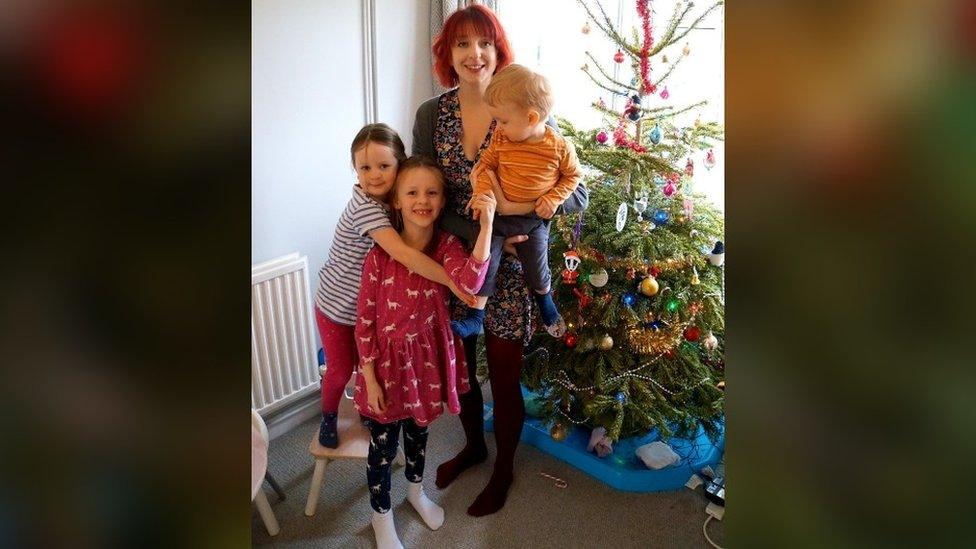
Katrin Oldridge says it is important for parents to be kind to themselves
Former teacher Katrin Oldridge, who runs parenting community website Norwich Mumbler, external, says it is important for mums and dads not to be too harsh on themselves and not to set their expectations too high.
The mother-of-three says: "Schools are not expecting parents to be teachers and to teach their children everything they would've learnt at school. Do what you can and don't worry.
"It needs to be whatever works for you, some people love a routine and love having a structure while some people like seeing how it goes.
"And even if you have a structure but something else comes up or it doesn't go to plan, don't worry about it. If you are making sure everyone is feeling happy, that's all you can do."
Mrs Oldridge, who lives in Sprowston, near Norwich, with her husband Andy and their children Ada, six, Hazel, three, and Remy, one, says while the sunny weather in the first lockdown was a "saviour", people should not shy away from venturing outdoors.
And even when parents are feeling like "everything is going wrong" and are "finding home-schooling too much", they they need to remember "to be kind" to themselves.
"You can't pour from an empty cup, you have to make sure you are OK before doing anything else," she says.
"I set myself two targets during the last lockdown to drink more water and to stretch more - having a little self-care target that wasn't hard to achieve, even with three kids, really helped."

'Children are incredibly resilient'
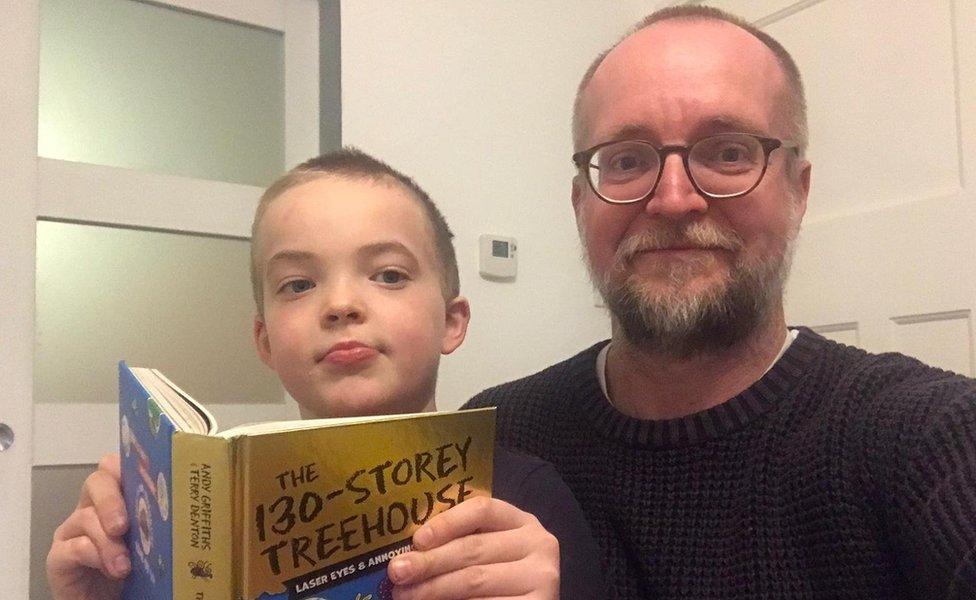
Paul Sorrell says the most important thing is "keeping stress and anxiety down"
In the Sorrell household, they have rearranged furniture in their Thorpe St Andrew home, on the edge of Norwich, ready for seven-year-old Oliver's home learning.
Dad Paul says he and his wife Eleanor found it difficult last time balancing home-schooling the Hillside Avenue Primary School pupil while looking after their three-year-old son Mack, while both working from home. They ended up working reduced hours to fit it all in.
The 49-year-old, who works for the Environment Agency, says: "The attention span is much different at home than in the classroom and it's a strange environment at home and trying to teach, and I'm not a teacher, but the school was understanding and had set up all of the online resources he needed.
"In the end, rather than trying to do all the different subjects, we decided to concentrate on spelling and maths and when he went back to school, he had done really well and it didn't have a negative effect on him."
Mr Sorrell says he is not as nervous this time around.
"The first time we were all getting a bit stressed after a few weeks but you can't have a home environment like that," he says.
"If we don't do as much as is required, it's going to be alright, we are not going to stress about it."
He adds: "The biggest worry is that you are not going to do the right thing by your children but keeping that anxiety and stress down is the most important thing - children are incredibly resilient, they bounce back."

Find BBC News: East of England on Facebook, external, Instagram, external and Twitter, external. If you have a story suggestion email eastofenglandnews@bbc.co.uk, external
- Published5 January 2021
